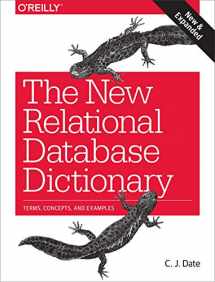
The New Relational Database Dictionary: Terms, Concepts, and Examples
Book details
Summary
Description
No matter what DBMS you are using—Oracle, DB2, SQL Server, MySQL, PostgreSQL—misunderstandings can always arise over the precise meanings of terms, misunderstandings that can have a serious effect on the success of your database projects. For example, here are some common database terms: attribute, BCNF, consistency, denormalization, predicate, repeating group, join dependency. Do you know what they all mean? Are you sure?
The New Relational Database Dictionary defines all of these terms and many, many more. Carefully reviewed for clarity, accuracy, and completeness, this book is an authoritative and comprehensive resource for database professionals, with over 1700 entries (many with examples) dealing with issues and concepts arising from the relational model of data. DBAs, database designers, DBMS implementers, application developers, and database professors and students can find the information they need on a daily basis, information that isn’t readily available anywhere else.


We would LOVE it if you could help us and other readers by reviewing the book
Book review



